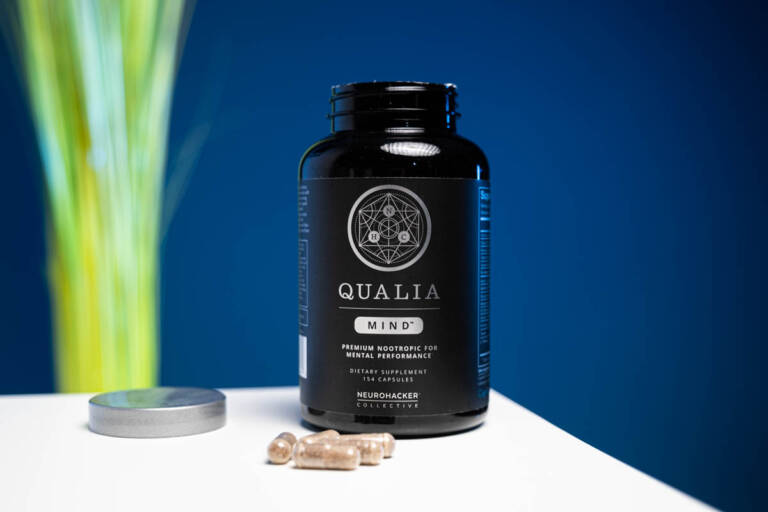A medicinal mushroom that has made a name for itself as a nootropic, Lion’s Mane boasts a unique name and an impressive appearance. It is known for several brain-boosting benefits along with some immune-strengthening potential presenting minimal side effects. But should you supplement it? Check out our full Lion’s Mane review.
Lion’s Mane Review
Resembling a fur ball, or if you’re a dog lover, then perhaps a Havanese, this is a mushroom variety that is used for culinary as well as medicinal purposes.
Given its unique appearance, it has earned many interesting names such as Hedgehog Mushroom, Monkey’s Mushroom, Old Man’s Beard, Bear’s Head, and even the Pom Pom Mushroom among many others.
However, it best goes by the name of Lion’s Mane or Hericium Erinaceus.
Historically, the mushroom has been used in traditional Japanese and Chinese medicine for a very long time. [1]
Other Asian countries like Korea and India are also known to use it as a curative ingredient for a number of conditions.
It mainly grows in the Northern parts, but you can also grow it at home. Find out here how you can grow them at home.
How Does It Work?
While many other nootropics work by modulating the production of different neurotransmitters, Lion’s Mane’s mechanism of action is slightly different.
Instead, it works on increasing the amount of a specific protein needed to regenerate neurons. [2]
Derived from its scientific name, Hericium Erinaceus, the two main active compounds present in Lion’s Mane go by the names of hericenones and erinacines.
Both have different but complementary functions that give Lion’s Mane its brain-boosting potential.
Of the two, hericenones assist the brain in generating more Nerve Growth Factor. On the other hand, erinacines crosses the blood-brain barrier to encourage neuron production.
Together, by crossing the blood-brain barrier, they stimulate NGF levels and boost the health benefits and survival of neurons in the central and peripheral nervous systems.
Since external sources of NGF cannot cross the blood-brain barrier, its production needs to be boosted internally. As such, hericenones and erinacines are potent inducers of Nerve Growth Factor synthesis.
Then there are beta-glucans, which are polysaccharides responsible for immune-boosting and immunomodulating properties.
There have been several clinical trials conducted to study the mushroom’s efficacy, but human trials are few.
Most of the studies have been done on animal subjects and await confirmation in humans.
Lion’s Mane Benefits
What are the main Lion’s Mane Benefits? Let’s check them out.
1. Lion’s Main Increases Nerve Growth Factor
Lion’s Mane Mushroom has been studied to increase NGF levels in the brain. [3]
NGF or Nerve Growth Factor is responsible for the maintenance and growth of neurons in the brain. It is a part of a large family of biomolecules known as neurotrophic factors. These biomolecules support the growth and survival of neurons.
The presence of NGF improves cognition by promoting the growth and branching of axons, which are thread-like nerve extensions.
The more healthy axons there are, the more efficiently they will conduct impulses. On the contrary, not enough NGF impairs cognition by triggering neural decay and the collapse of nerve cells.
Many neurological disorders, such as Huntington’s disease and Parkinson’s, are associated with neural degradation over time.
It is believed that neurotrophic factors like NGF may play a part in preventing the onset of such conditions.
2. Lion’s Mane Prevents Neurodegeneration
Neurons have the potential to regenerate but need the right conditions to do so.
For instance, a decrease in NGF levels can cause brain cells to die without being replaced. This impacts neurogenesis, which is the natural birth and growth of neurons.
As the human brain ages, the production of new neurons slows down. The old ones begin to die, and when replacement gets slow, age-related diseases start to set in.
At the same time, neuroplasticity, which refers to the ability of the brain to change the structure, including the internal structure of neurons, also slows down.
This means that your short and long-term memory suffers. To prevent such issues with cognitive impairment, studies show that supplementing with Lion’s Mane may be beneficial to averting neural degeneration. [4]
3. Lion’s Mane And Immunomodulation
Poor immune response and function are the underlying causes of many chronic diseases.
However, a response system known as immunomodulation can help support the immune system using biological cofactors along with nutrients and herbs.
In this respect, beta-glucans can be useful tools to modulate the immune system.
However, these do not occur naturally within the body and need to be consumed from sources such as Lion’s Mane mushrooms among others.
Beta-glucans contain sugar molecules joined together. These branch-like structures bind and help specific immune cells to attack hostile targets.
These modified responses support immunomodulation by stopping inflammation and an autoimmune response.
Also, beta-glucans also stimulate immune stem cells inside the bone marrow.
This production releases new immunocytes into the blood and improves the immune response against potential invaders for everything from the common cold to tumor cell growth. [5]
4. Lion’s Mane Fights Inflammation
Lion’s Mane bears an anti-inflammatory effect by a few different mechanisms.
For instance, it reduces excessive nitric oxide, which is an essential signaling molecule and a component of the inflammatory response. [6]
Lion’s Mane also regulates prostaglandin production. Prostaglandins get produced in response to infection or injury, causing inflammation.
While this is an integral part of the body’s healing process, this natural process can sometimes lead to excess and chronic production of prostaglandins.
This can lead to inflammatory conditions brought on by unwanted inflammation. When this happens to supplement with Lion’s Mane can help regulate inflammation. [7]
Other areas where Lion’s Mane shows anti-inflammatory activities is by reducing pro-inflammatory cytokines as well as oxidative stress.
Together all these mechanisms can have a significant impact on conditions such as autoimmune diseases, digestive disorders, metabolic disorders, and much more.
5. Cancer-fighting Properties Of Lion’s Mane
The immune-strengthening effects of this edible mushroom can have immense benefits for cancer patients who already suffer from compromised immune systems.
In such individuals, this can happen either due to the disease itself or by the strong and sometimes toxic anticancer therapies they need to undergo.
In this regard, one animal study shows Lion’s Mane extracts to reduce the weight of transplanted colon tumors in mice. [8]
At the same time, the extracts also doubled the number of NK or Natural Killer cells while enhancing macrophage activation.
Of these, NK is a kind of white blood cells that target and attack infected cancerous cells.
And macrophages are another white blood cell type which disposes of anything not identifiable as healthy or normal body tissue including cancer cells. The study also showed that Lion’s Mane extract prevented angiogenesis.
This is the process whereby new blood vessels form from old ones. When this happens, it becomes easier for cancerous cells to spread and invade neighboring organs and tissues.
But when angiogenesis halts, this mechanism also stops and prevents benign tumors from becoming malignant.
6. Anti-depressant Properties Of Lion’s Mane
Lion’s Mane mushroom has also shown potential in reducing anxiety and depression.
A study that involved investigating menopausal symptoms such as irritability, loss of concentration, and anxiety all went down when treated with Lion’s Mane. [7]
Besides, when these bothersome symptoms subsided, subjects also reported improved sleep quality.
One component of Lion’s Mane known as amyceneon has shown antidepressant in animal studies. [8]
There is also some evidence that depressive symptoms may be linked to neurological inflammation and given its anti-inflammatory effects, Lion’s Mane may be able to ward off such unwanted emotional responses.
Lion’s Mane Side Effects
Lion’s Mane supplement is contraindicated for individuals who have massive allergies, or an overactive immune system.
This could be because, during episodes of allergic reactions, there is degranulation of mast cells.
This basically means that when mast cells degranulate, they release histamine, among other things, which causes anxiety and other issues.
NGF has been shown to cause such mast cell degranulation and aggravate the condition.
Otherwise, it is non-toxic and well-tolerated by most people.
Unlike other nootropics, Lion’s Mane doesn’t produce quick-yielding results and needs to be taken for extended periods for any noticeable effects.
Lion’s Mane Dosage
As with other nootropics, the dosage will be determined by the extract’s strength.
Commercial preparations can vary significantly in purity, strength, and composition, making it very difficult to establish an optimal dose.
However, with a 30% polysaccharide content, it is recommended that daily dosage should be between 500-1,000 mg taken one to three times daily.
Or, for other options, dosage ranges can vary between 300 and 3,000 mg taken 1-3 times every day.
Human studies on Lion’s Mane nootropic are limited, so no optimal dosage standard has been maintained.
It is best to read the label to follow the manufacturer’s recommended dose. Also, start with a lower dose to see how well your body tolerates it.
To stack with other nootropics for a quick improvement of cognitive function, you can use Lion’s Mane with alpha GPC, aniracetam, and omega 3s (more info below).
For long-term cognitive enhancement, which can take from several weeks to a few months, stacking options vary somewhat.
Experts recommend using Lion’s Mane mushroom with uridine and fish oil.
Both these offer cellular protection. Then there is zinc which can regulate synaptic function.
And finally, there is acetyl-L-carnitine or ALCAR that reduces brain cell death.
Lion’s Mane Reviews and Feedbacks
There are mainly positive feedbacks on Lion’s Mane. Here are some of them:
"I'm 25 years old and heard about Lion's Mane supporting Neurogenesis. I took this for a couple of months and I DID notice more mental clarity. I believe that over long periods of time this helps regrow neurons."
"Works great to enhance mental clarity and performance. As a writer, I love this product. A must have for those who need help with focus. My wife has also stared using this herb. Has been beneficial to her stomach problems and focus."
"I typically have trouble remembering little things like where I put my keys, or to bring something with me when I leave the house, and have definitely seen an improvement since starting this dietary supplement. I can't rule out the placebo effect, but hey, whatever works!"
Where To Buy Lion’s Mane?
We recommends to stack Lion’s Mane mushroom with other effective nootropics for best results.
That’s how you will be able to optimize your brain function and body performance.
Click on the button below to find our top-rated supplement with Lion’s Mane mushroom.
Frequently Asked Questions
Is Lion’s Mane mushroom legal?
Yes, based on our research, Lion’s Mane mushroom is legal in many countries around the world. You can also buy it online and have it shipped to your country.
Is Lion’s Mane mushroom psychedelic?
No, Lion’s Mane mushroom is not a psychedelic. It is a nootropic that is known for its cognitive-boosting benefits.







2 thoughts on “Lion’s Mane Review: Should You Supplement This Nootropic?”
I’ve always wondered how big a difference there is between the various nootropic mushrooms.
Looking at Reishi it also contains a high concentration of beta glucans, no erinacines or hericenones though.
Another thought, with Reishi it is also said that the effects are no immediate and only follow after supplementing for a few weeks. Though I did notice a direct improvement in my sleep quality.
Unfortunatly that effects seems to have weared off after a few months of usage.
What are your thoughts?
Hi there, I’m not such a big expert on mushrooms in general, but I know they take some time to really feel the benefits. :)